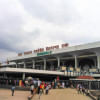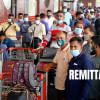EC mulls hybrid voting method for expatriates

The Election Commission (EC) is assessing the feasibility of three alternative methods -- postal ballots, online voting, and proxy voting -- to ensure voting rights for expatriates.
Election Commissioner Brigadier General (Retd) Abul Fazal Md Sanaullah shared this information at a press conference on the expatriates' voting process, held at the media centre of the EC building in Agargaon.
He said the chief adviser had mentioned the need to grant voting rights to expatriates in his first speech. "We looked at 178 countries and found that 115 of them have provisions for their expatriate citizens to vote. The most commonly followed method is voting at embassies, followed by postal ballots, and then online or proxy voting," he added.
Following the discussion, a workshop was conducted with experts in elections, law, technology, and electoral management, where 10 teams presented their findings.
Representatives from Dhaka University, Buet, MIST, the Ministry of Social Welfare, the Ministry of Posts and Telecommunications, and other relevant bodies participated.
The commissioner stated, "We have examined the advantages and disadvantages of the three methods. Regardless of which method we choose, expatriates will first have to register online. For Bangladesh, a single method won't suffice -- a hybrid approach will be necessary. Each method has its strengths and weaknesses. Mock testing will be required for all of them. Most likely, all methods will need to be implemented on a limited scale initially as a pilot."
The EC commented, "Around 25 countries in the world use proxy voting. If we want to ensure the highest voter turnout, proxy voting is the only option. However, many have also pointed out the weaknesses of proxy voting. If we can incorporate all three methods, then we will adopt all three. Let's first see what recommendations the advisory committee provides."
In response to a question about whether expatriates would be allowed to vote in local elections, he said, "We will start with national elections first. Only then can we discuss including them in local elections."
When asked how long it would take for expatriates to use the voting system, he replied, "Until the system is developed, we cannot specify how much time it will take. The Election Reform Commission has recommended postal and online methods and has outlined eight steps for the trial phase. However, the duration of the trial is yet to be determined. Therefore, only technical experts can provide an answer in this regard."
In a related development, the Bangladesh Minority Janata Party (BMJP) has officially received registration from the Election Commission with the electoral symbol of "Rocket".
With this new party, the total number of registered political parties in Bangladesh now stands at 50.
The registration was granted to BMJP in compliance with a court directive, marking a significant milestone for the party. "We have finally received our long-cherished registration certificate today. The dream has come true," BMJP President Sukriti Kumar Mondal said.
BMJP has been assigned registration number 55. The party applied for registration in 2018 but was not granted it at that time.
BMJP was launched in 2017 by a group of 101 core members at an event at the Jatiya Press Club.

 For all latest news, follow The Daily Star's Google News channel.
For all latest news, follow The Daily Star's Google News channel. 







Comments